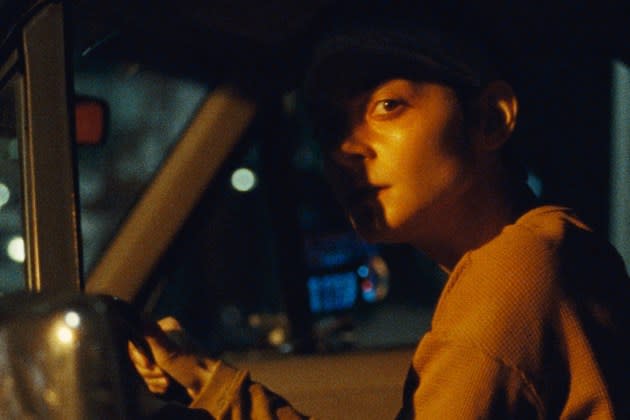‘Gazer’ Review: A Striking ‘Memento’-Like Noir That Keeps Viewers at a Stylish Distance

It takes a certain confidence for a film to open as Gazer does, with the exhortation to pay attention. “What do you see? Focus,” a disembodied voice instructs, inviting the viewer to pore over details. Perhaps you take note of the figure slumped on the sidewalk, or the other bodies moving behind windows. Maybe you drink in the grimness of the industrial New Jersey setting, or the brittleness of the heroine (Ariella Mastroianni).
Gazer rewards you for all this looking with an eye for striking imagery and careful compositions. But the act of observation can also imply a certain remove. As painstakingly crafted as this mystery-thriller is, it remains something to be admired from a distance rather than felt viscerally.
More from The Hollywood Reporter
Kelly Rowland Filmed Having Tense Exchange With Security at Cannes
'Elementary' Review: Claire Simon's Compassionate Study of French Public Education
Arguably, its chilliness reflects its heroine’s own sense of disconnection. When we meet her, Frankie (Mastroianni) is deep into a progressive neurological disease that causes her to lose time to what are essentially sober blackouts. To keep her condition at bay, she spends nearly every waking minute listening to homemade cassette tapes reminding herself to stay alert; that’s her voice at the start prompting her to take stock of her surroundings, lest she zone out and lose hours to the black hole of her memory.
Ryan J. Sloan, a former New Jersey electrician making his feature filmmaking debut, brings us into Frankie’s headspace with a ’70s-style grittiness. A shaky handheld camera reflects the instability of Frankie’s reality, with a graininess that adds extra scruff to the dirty streets, dingy basements and jail-like apartment where she spends her time.
Particularly evocative is the film’s soundscape, which mellows or sharpens with Frankie’s moods. When she listens to tapes of happier times with the young daughter who’s been taken from her care, the recordings grow almost painfully tinny. As she spaces out during a support group for survivors of suicide loss, the voices gradually melt into an undifferentiated drone.
It is during one of these meetings that Frankie meets the woman who’ll kick the story into gear. Frankie had first spotted Paige (Renee Gagner) fleeing from her apartment some nights earlier, and now Paige approaches with a proposition: If Frankie will help Paige steal her car back from her abusive brother, Henry (Jack Alberts), she’ll pay her $3,000 — a veritable fortune to Frankie, who’s just been fired from her job as a gas station attendant. In typically noirish fashion, however, the money isn’t as easy as it seems. When Paige fails to show for the handoff, Frankie sets out looking for her, partly because she needs the money but also because she’s growing increasingly worried that something awful has befallen Paige.
Gazer (co-written by Mastroianni and Sloan) evokes Memento as Frankie follows a trail of breadcrumbs to seedy motels and roaring factories and nondescript apartment buildings — all while trying to keep one step ahead of her own condition. When she breaks into Henry’s home or follows him to his job, her vulnerability is further heightened by the possibility of an episode striking her at any given moment. And always looming in the background is the question of whether Frankie herself might have had a hand in Paige’s disappearance, during the chunk of time that conveniently went missing before their agreed-upon meet.
Though Frankie dismisses this possibility out of hand when she’s questioned by the cops, it’s one that seems to haunt her on some level deeper than she can bear to acknowledge, especially since it so strongly echoes the trauma that wrecked her life. From the first minutes, Mastroianni’s performance makes clear that Frankie is walking wounded, folding into herself so tightly that she might be trying to disappear herself completely. Her nightmares offer clues as to why. Asleep, Frankie is visited by images of herself in another home, with a man, with a gun in her hand, with blood at her feet. As these visions turn more surreal, they take on the scratchy, overheated quality of some horror VHS tape that was supposed to stay lost in the basement.
These make for some of Gazer‘s most riveting sequences, but they’re also a reflection of the film’s greatest shortcoming: namely, that its deepest emotions remain locked away, relegated to abstract symbolism. The question of what became of Paige eventually furnishes an answer that’s firm but not terribly interesting, while the one of what happened to Frankie never reaches a definitive conclusion, and Gazer never convincingly marries the two mysteries on either a narrative or thematic level. So we are left with the shape of Frankie’s grief, but not the texture of it. Her lost family feel more like theoretical ideals than flesh-and-blood humans she knew intimately at some point.
But we’re also left with an appreciation for how deftly Sloan has constructed this world, how clearly he sees this woman who might otherwise move unnoticed through nondescript streets. “Where do you think they’re going, coming from, hiding from?” Frankie asks herself as she scans the crowd around her. “Who are they? Do they know?” Sloan’s gift is that he has the curiosity to wonder, and the self-assurance to bring the stories he imagines into visually arresting life.
Best of The Hollywood Reporter
